
GENETIC TESTING
Know Your Genetic Risk for Alzheimer’s Disease
The GenoRisk™ Alzheimer’s at-home test provides a genetic risk score based on the evaluation of multiple genes to establish your risk for Alzheimer’s disease. Your individualized report will provide your personal GenoRisk Alzheimer’s Score. * **
* Not available to NY residents ** This test is not intended for individuals with a family history of early-onset Alzheimer’s disease (under age 60), familial Alzheimer’s disease (having an APP, PSEN1 or PSEN2 mutation) , or individuals that have already been diagnosed with Alzheimer’s disease.
Every 65 seconds, someone in the United States is diagnosed with Alzheimer’s disease. There are now more than 6 million Americans living with the disease.








AGE
LIFESTYLE
GENES
MEDICAL FACTORS
Your Risk for Alzheimer’s Disease
LATEST PODCAST
Episode #61 - Dr. Ryan Fortna: The genetic side of Alzheimer’s disease
This episode of the Thinking Health Podcast Features Dr. Ryan Fortna, President of Avero Diagnostics, Director of Molecular Pathology, and Scientific Director of ADx Health.Dr. Fortna did his PhD at the University of Pennsylvania in Cell and Molecular Biology and was focused on the cell biology of Alzheimer’s disease, in particular the gamma secretase complex (which is the enzymatic protein complex responsible for converting APP (the protein version of the gene I mentioned on the podcast that is one of the three genes that can have mutations that cause Familial Alzheimer’s) into A-beta (the protein fragment that causes amyloid plaques)).
In this episode, we talk a lot about the genetic side of Alzheimer’s disease going in-depth on the differences between deterministic and non-deterministic genes, APOE4, other important genes for Alzheimer’s, and how lifestyle can be a powerful approach for combating your genes and reducing your risk of Alzheimer’s.
How it Works




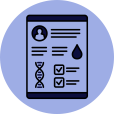
ORDER ONLINE
Your test kit is shipped directly to your home. Your kit will arrive in about 3-4 days, depending on your location.
REGISTER ONLINE
Once you receive your kit, follow the instructions to create your account and register your kit online.
COLLECT & SHIP
Follow the instructions included in your kit to collect your saliva sample and return it in the prepaid envelope.
PROCESSING SAMPLE
Your sample is received and processed at the lab and your genetic material is evaluated for your risk of Alzheimer’s disease.
YOUR RESULTS
Your results will be delivered online in about 7-10 days and you'll have a chance to speak with a medical professional or share with your physician.
What Does GenoRisk Alzheimer’s Measure?
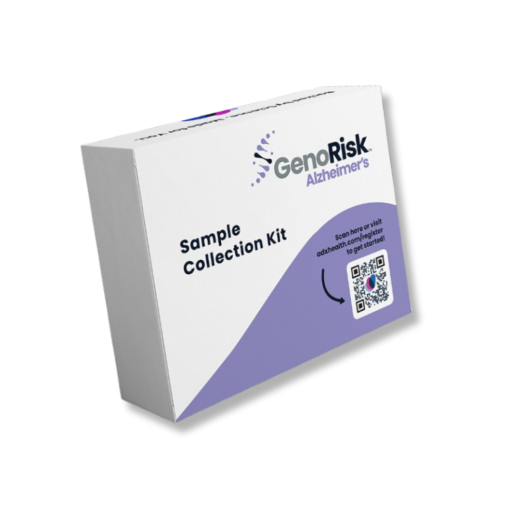
The GenoRisk Alzheimer’s panel evaluates 31 genetic variants found in 23 different genes. The test includes an evaluation of your ApoE status, a gene that alone accounts for approximately one-quarter of the heritability of Alzheimer’s disease. The GenoRisk score is based on a proprietary algorithm developed by a team of scientists, clinicians, and statisticians. All testing is performed in our physician-owned, CAP-accredited and CLIA-certified laboratory in Bellingham, WA.
Your DNA is extracted from your saliva sample, then certain segments of the DNA are amplified by PCR (polymerase chain reaction) and subsequently analyzed by mass spectrometry to distinguish the potential variants at each region of interest.




Recent Articles
Understanding Alzheimer’s Disease
The Brain-Gut Connection: How Your Gut Health Affects Your Brain Function
What are the Top 10 Alzheimer’s Caregiver Challenges?
Aug 1, 2023 | 10 min read
What is Alzheimer’s Disease? Alzheimer’s disease, the most common form of dementia, affects an estimated 6.7 million Americans over the age of 65, a number that is expected to grow to 8.8 million by 2050. Dementia is an umbrella term that refers to changes in brain...
Apr 23, 2023 | 4 min read
It's no secret that our gut plays a vital role in our overall health and well-being. However, recent research has shown that the connection between our gut and brain goes even deeper than we previously thought. In fact, there is a complex and intricate relationship...
May 9, 2023 | 4 min read
Caregiving for an Alzheimer's patient is one of the most demanding roles a person can undertake. Here are 10 challenges a caregiver faces when caring for someone with Alzheimer’s disease.
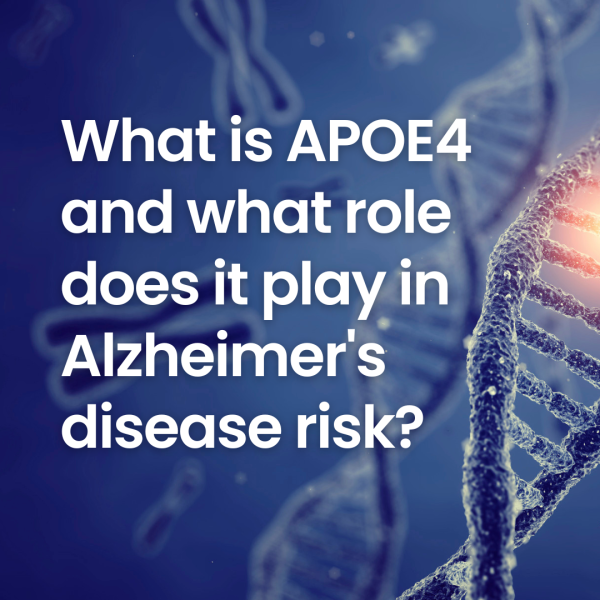
APOE GENE
The APOE gene produces "apolipoprotein E," which moves fat in the body. People inherit two APOE gene copies (one from each parent), resulting in three forms: APOE-e2, e3, and e4. These forms lead to six combinations. APOE-e2 might lower Alzheimer's risk, e3 has average risk, and e4 raises risk. One e4 copy triples risk, two copies increase risk twelvefold.
APOE status isn't a diagnosis but a part of risk, alongside other factors. Possessing e4 doesn't guarantee Alzheimer's. It is also possible to carry no copies of the APOE-e4 gene and still develop the disease. This is an important reminder that there are many factors that go into risk for developing Alzheimer’s disease.
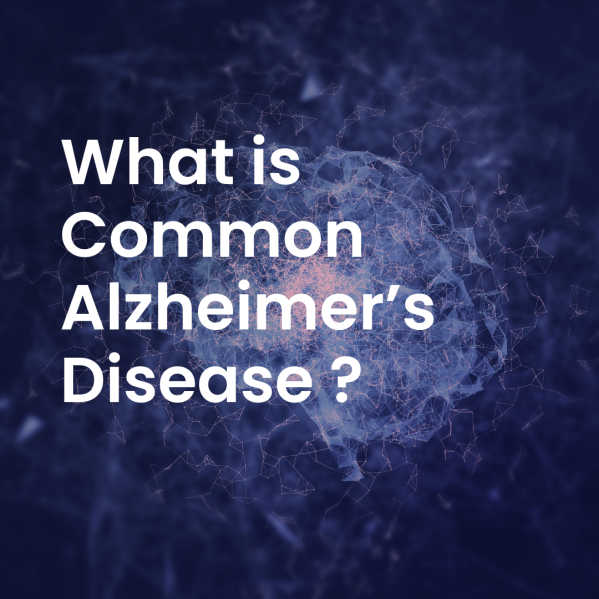
Common Alzheimer's Disease
Common or sporadic Alzheimer's disease refers to the most prevalent form of Alzheimer's, accounting for the majority of cases. It is distinct from familial or inherited Alzheimer's disease, which is caused by specific gene mutations passed down through families.
Common Alzheimer's disease typically occurs later in life and does not have a clear-cut genetic cause. While certain genetic factors may increase the risk of developing common Alzheimer's, they do not guarantee its occurrence. Other factors such as age, lifestyle, and environmental influences also play a role in its development.
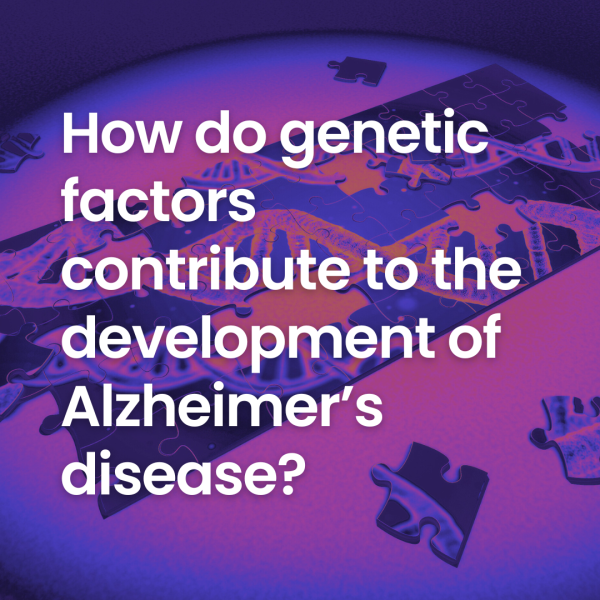
GENETIC FACTORS AND ALZHEIMER'S
Genetic factors play a role in the development of Alzheimer’s disease by influencing an individual’s susceptibility to the condition. Certain genes can increase the risk or alter the age of onset for Alzheimer’s. For example, the APOE4 variant of the APOE gene is associated with an increased risk and earlier onset of the disease. The presence of APOE4 may influence the metabolism and accumulation of amyloid-beta, a protein that forms plaques in the brains of individuals with Alzheimer’s. Additionally, genes such as PSEN1, PSEN2, and APP are involved in the processing and production of amyloid-beta. Mutations in these genes can lead to an overproduction or altered processing of amyloid-beta, contributing to the development of the disease.
While genetic factors are important, it’s worth noting that they are just one piece of the puzzle, and environmental and lifestyle factors also play significant roles in the development of Alzheimer’s disease.
Alzheimer's Disease Statistics 2024
Alzheimer's begins 20 years or more before memory loss and other symptoms develop
An estimated 6.7 million Americans aged 65+ are living with Alzheimer’s dementia in 2023
About 1 in 9 people (10.8%) age 65 and older has
Alzheimer’s dementia
Source: Alzheimer's Association https://www.alz.org/media/documents/alzheimers-facts-and-figures.pdf
YOUR KIT INCLUDES
- Instructions to collect your sample
- Saliva collection tube
- Small funnel
- Biohazard bag
- Return shipping materials
KNOWING YOUR RISK COULD CHANGE YOUR LIFE FOR GOOD
Order your at-home test today to learn more about your risk for Alzheimer’s disease.






